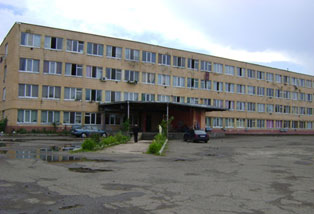Shorena Kakabadze, Kutaisi
48 families displaced from Kodori Gorge live in the former building of the Military Lyceum, in the territory of auto-factory in the outskirts of Kutaisi. They recalled the August War and their tragedy only with their neighbors. Humanrights.ge visited the family of Patima Otkhvani, an IDP from Kodori.
“All TV-Companies have been reporting about the 2008 war from the early morning. Government officials render honor to the memorials of the killed in the war, visit families of the killed soldiers and IDPs from Tskhinvali. They all recall August 8, 2008. Unfortunately, nobody recalled about us though we also endured that tragedy. Thanks to God, nobody died in the gorge. Unlike Tskhinvali and Gori, the conflict finished without bloodshed in our region but it was painful for us too,” Patima Otkhtvani from Kodori gorge could not help crying.
Fleeing from Kodori is nightmare for them.
“That day was as painful for me as the death of my daughter. In 2006 my 26-year-old daughter died in the accident. On August 10, 2008 I parted with both her cemetery and my home. Our village was bombed from early morning. Local government convinced us there was nothing dangerous. There was a military unit near our village and the attack started from there. Then a shell fell in our yard and the nightmare started. I ran into the house; grabbed photos and things of my dead daughter and fled from the village together with other people. I left the most precious things there,” 72-year-old woman took photos of her daughter and showed to us. She keeps a photo of the gorge too.
She learned from her close relatives that Russian military vehicles are moving alongside their village road. Two four-storied buildings were constructed in their village and Russians live there now.
“We finally lost Abkhazia when gave up the Kodori Gorge. Russians seized it from us without any resistance. Our government was bribed – they gave up the gorge without hesitation. But we were defending it so carefully. 7-8 young men were guarding the gorge once per week and were defending the area at the expense of their lives. They protected it during 15 years. Today, nobody remembers those boys and us. Though we also have share in the pain of August 8; it is very painful.”
The one-room flat was not registered on the family of Otkhtvanis though it was promised, they receive an allowance of 28 lari, could not get status of socially indigent because social agent granted 90 000 points to them because they had a stove at home – this is not full list of problems of the family. They have applied to the local office of the Abkhazian legitimate government several times but in vain.
“They asked for the electricity bill. Having seen that we had spent electricity for 12 lari, the agent asked how we could complain about poverty if we spent so much electricity. How can I tell my young son not to take bath to save electricity? We do not request anything special, we just need minimal attention. They should allow us to live normally. There was a little plot in the yard; we were cultivating it and grew herbs there. They came and paved with plates without asking anything. Yes it is beautiful but we preferred to have a garden there. We have addicted to hard-work and love working in the garden,” her eyes are full of tears.
Ms. Khatuna lives in the flat together with her old husband and son. She misses her house and daughter’s cemetery that is now on the other side of the occupation line.
“Sometimes I have feeling that I live the life of another person. We are burdens for everybody here including the new government whom I voted for in the last year’s parliamentary elections like all my neighbors. We hoped they would make our lives easier,” Khatuna Otkhtvani said.
News
December 13, 2023
Ethnic minorities outside the peace dialogue
November 6, 2023
‘Peace’ agenda of political parties
Popular
Articles
February 13, 2024




